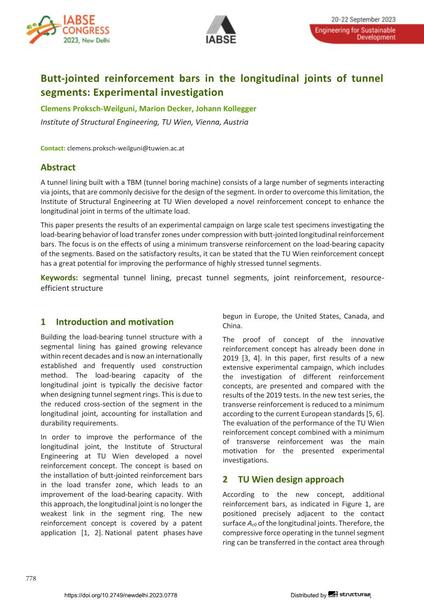Butt-jointed reinforcement bars in the longitudinal joints of tunnel segments: Experimental investigation

|
|
|||||||||||
Bibliografische Angaben
| Autor(en): |
Clemens Proksch-Weilguni
(Institute of Structural Engineering, TU Wien, Vienna, Austria)
Marion Decker (Institute of Structural Engineering, TU Wien, Vienna, Austria) Johann Kollegger (Institute of Structural Engineering, TU Wien, Vienna, Austria) |
||||
|---|---|---|---|---|---|
| Medium: | Tagungsbeitrag | ||||
| Sprache(n): | Englisch | ||||
| Tagung: | IABSE Congress: Engineering for Sustainable Development, New Delhi, India, 20-22 September 2023 | ||||
| Veröffentlicht in: | IABSE Congress New Delhi 2023 | ||||
|
|||||
| Seite(n): | 778-784 | ||||
| Anzahl der Seiten (im PDF): | 7 | ||||
| DOI: | 10.2749/newdelhi.2023.0778 | ||||
| Abstrakt: |
A tunnel lining built with a TBM {tunnel boring machine} consists of a large number of segments interacting via joints, that are commonly decisive for the design of the segment. In order to overcome this limitation, the Institute of Structural Engineering at TU Wien developed a novel reinforcement concept to enhance the longitudinal joint in terms of the ultimate load. This paper presents the results of an experimental campaign on large scale test specimens investigating the load-bearing behavior of load transfer zones under compression with butt-jointed longitudinal reinforcement bars. The focus is on the effects of using a minimum transverse reinforcement on the load-bearing capacity of the segments. Based on the satisfactory results, it can be stated that the TU Wien reinforcement concept has a great potential for improving the performance of highly stressed tunnel segments. |
||||
